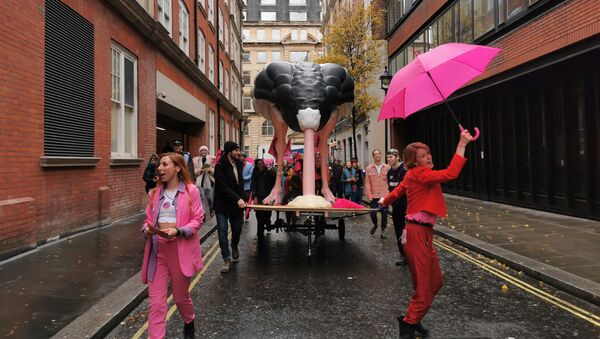The ongoing COVID-19 crisis has led Extinction Rebellion (XR) to review its progress and identify fresh protests for a green economy in a post COVID-19 world, spokesperson Prof Rupert Read told Reuters.
The global environment group has been redirecting its efforts to providing "neutral" community aid and protests against UK government plans to restart development of the High Speed 2 railway network amid the pandemic, Mr Read told Reuters climate change correspondent Matthew Green at the Ethical Corporation's Responsible Business Week virtual event.
"It's going to be different, it's going to be focused a lot on the absolutely vital moment that this pause represents, [the] vital opportunity for mankind this Coronavirus reset offers", he said.
The group may change its protest methods amid COVID-19, including focusing on the role of capital and finance in climate change and remaining "physically distanced" in public spaces such as motorways and airport runways, Prof Read explained.
"The message that we want to give at this time includes, centrally, the thought that there must be no going back. If we go back to the way we were living before the coronavirus crisis, if we don't use this opportunity to make a profound reset, then we are throwing away that which is, basically, our last chance to avoid a civilisational collapse," he told Mr Green.
But many companies concerned over profits and revenues depended on respective governments and consumers to maintain profitability despite failing to address the climate crisis, according to Prof Read.
— Rupert Read 🌍 (@GreenRupertRead) April 13, 2020
"We believe that nobody has got it yet in terms of how serious things are, or if they have, then they haven't found a way of acting accordingly," he said.
The ongoing COVID-19 crisis allowed people to choose whether to adopt an "eco-driven societal collapse" or "voluntary rapid changes" in industry, he said.
But he slammed government proposals for reaching carbon-neutral targets by 2050, stating they were "completely inadequate".
"There's no good reason that we will make it to 2050 if we're not trying to achieve net carbon zero way before that. It's completely reckless to not try to achieve it must faster", he added.
The comments come after the climate change group launched a months-long global campaign across 60 cities last year, where activists blocked infrastructure including roads, motorways and bridges in a bid to pressure global governments to tackle climate change and ecocide, among other concerns.
Thousands were arrested in October last year in the UK after crowds staged sit-ins and glued their bodies to aircraft and airport terminals, with some blocking entry to DLR stations in London City, the Bank of England and London Stock Exchange.




